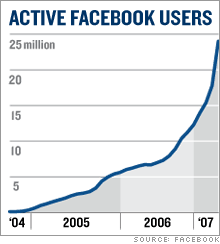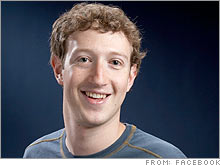Facebook's plan to hook up the worldThe company's boy-wonder CEO wants to take social networking out of the dorm room and make it a platform for new businesses, reports David Kirkpatrick in a Fortune exclusive.NEW YORK (Fortune) -- Imagine that when you shopped online for a digital camera, you could see whether anyone you knew already owned it and ask them what they thought. Imagine that when you searched for a concert ticket you could learn if friends were headed to the same show. Or that you knew which sites - or what news stories - people you trust found useful and which they disliked. Or maybe you could find out where all your friends and relatives are, right now (at least those who want to be found). (This is an expanded version of a story in the June 11, 2007 issue of Fortune.)
 This isn't fantasy. Facebook might make it possible, and soon. Yes, the social-networking site college kids spend so much time on - the one you thought was just about hooking up - could turn out to be more important than any of us thought. In late May, the company's 23-year-old CEO, Mark Zuckerberg, got up in front of several hundred journalists, analysts, and industry leaders in San Francisco at an event the company called F8 (think of it as "fate") to say that Facebook would no longer be just another social-networking site. Instead, he said, it aims to be the place where you can involve your friends in everything you do online. The company has 24 million members (less than half of whom are now in college), and it is adding about 150,000 a day. In effect, Facebook is now offering the opportunity for any company, Internet service, or software maker - anyone at all, really - to build services for its members. In advance of the announcement, which had Silicon Valley buzzing, Zuckerberg and other executives spoke to Fortune about the strategy. "We want to make Facebook into something of an operating system so you can run full applications," Zuckerberg told me. He said Facebook is becoming a "platform," meaning a software environment where others can create their own services, much the way anyone can write programs for Microsoft's Windows operating system on PCs. Facebook, he explained, is a technology company, not a media one. Zuckerberg sometimes lapses into jarringly grandiose language, for example when he told me that what Facebook is unveiling would be "the most powerful distribution mechanism that's been created in a generation." He may be crazy, but then again, he is something of a boy wonder. He consults frequently with Microsoft chief software architect Ray Ozzie and counts Washington Post Co. CEO Don Graham as a friend. Microsoft and the Post Co. were among the 65 companies that launched 85 new Facebook applications at F8. That so many companies jumped aboard right away is a measure of the enthusiasm businesses have for social networking. Facebook's chief operating officer, Owen Van Natta, describes the opportunity this way: "Take anything today on the Internet and overlay a lens that is the people you know and trust." What wouldn't be more useful or enjoyable viewed through that lens? Watching football? Studying the history of Vikings? Shopping? Planning a vacation? Even - perish the thought - online sex? (Don't presume propriety. The only limit, says Zuckerberg, is that applications be legal.) Take those examples of community-empowered applications at the start of this story. At least two of them aren't even hypothetical. A company called Digg already allows people to share and rate favorite news stories online. Now it is offering a version of its service on Facebook, which could allow it to accumulate users more quickly. And a company called iLike launched a service at F8 that allows members to connect at concerts. Non-Internet brands like Red Bull are developing Facebook applications too. Today, social networking is fragmented. There are networks for dating, for philanthropy, for pet owners, for parents. But each has its own ways for members to register, describe themselves, communicate, and interact. Facebook aims to make much of that unnecessary. It will provide the underlying services - a platform - and offer access to its prerecruited pool of members. It will retain some online real estate and will still generate the lion's share of its revenue from advertising. The platform expert has taken notice: Microsoft (Charts, Fortune 500) is Facebook's biggest business partner. Last year it contracted to broker banner ads for Facebook, reportedly guaranteeing a minimum of $100 million per year through 2011. Zuckerberg met with Bill Gates this spring, and two weeks before F8, Ozzie diverted his company jet for a quick Friday 8 a.m. meeting in a conference room at San Francisco Airport. There, Zuckerberg gave his first demonstration of Facebook's platform. (Ozzie is said to be fascinated by Facebook, but he declined to discuss it for this story.) Microsoft's own workplace network within Facebook has 10,000 members. At F8, Microsoft announced tools to make it easy to create links between Windows applications and Facebook's network. Microsoft's imprimatur is a big first step in transforming a company that until now has been just another social network - albeit a hugely successful one, second only to giant MySpace. Neilsen/NetRatings counted 14 million unique U.S. web visitors to Facebook in April, compared with 57 million at MySpace, though Facebook is growing three times as fast. Both services, along with scores of smaller ones, offer a profile page to compile information about yourself - your sign, your favorite music, your major and class, or your job, and probably your sexual preference. You then "friend," or link to, others via their profiles, and exchange messages, join groups, and engage in a variety of collective activities. Among the younger set, e-mail is increasingly passé. Instead, when they want to reach someone they "facebook" them. Groups can emerge for anything. One group of 227,000 at Facebook supports Barack Obama, and for some reason 143,000 - presumably mostly feckless college kids - have joined the group "I Secretly Want To Punch Slow Walking People In The Back Of The Head." What sets Facebook apart - and makes its new direction possible - has a lot to do with its emergence from the hothouse of undergraduate life. Founded in February 2004 in Zuckerberg's Harvard dorm room, it required students to join using their real name and college e-mail address. So a culture of authentic identity became part of Facebook's DNA. At most other social networks, role-playing, pseudonyms, and anonymity are rampant - "On the Internet nobody knows you're a dog," as the classic New Yorker cartoon put it. Facebook became not so much a place to meet new people as a tool to lubricate and intensify relationships with the people you already know. And yes, sex has from the start played a big role in Facebook's popularity on campus. It even still has a feature which enables you to "poke" another member - something most people interpret to mean a sexual come-on. I can tell you my Facebook friends aren't using it on this 54-year-old married guy. |
Sponsors
|

